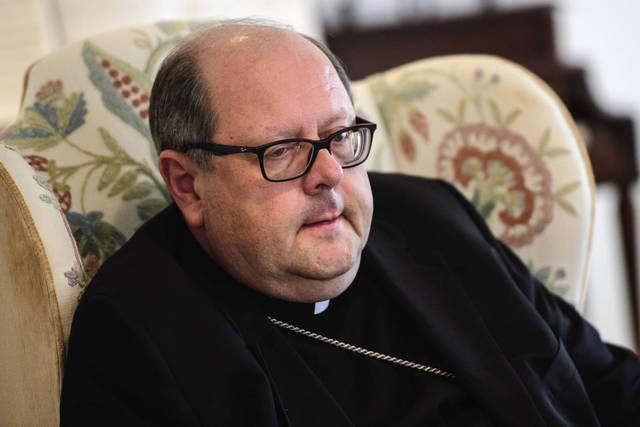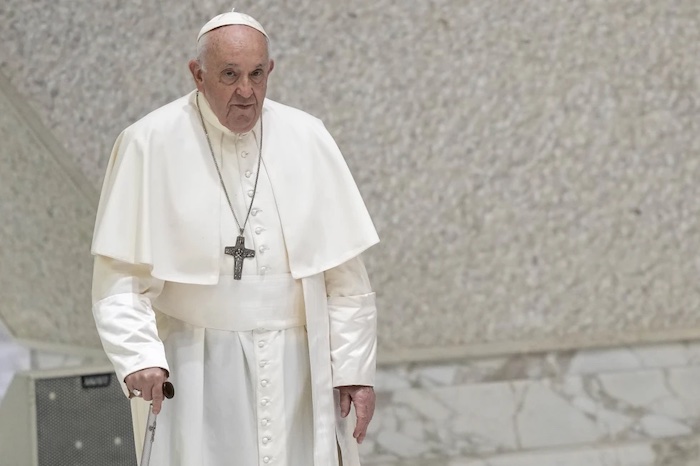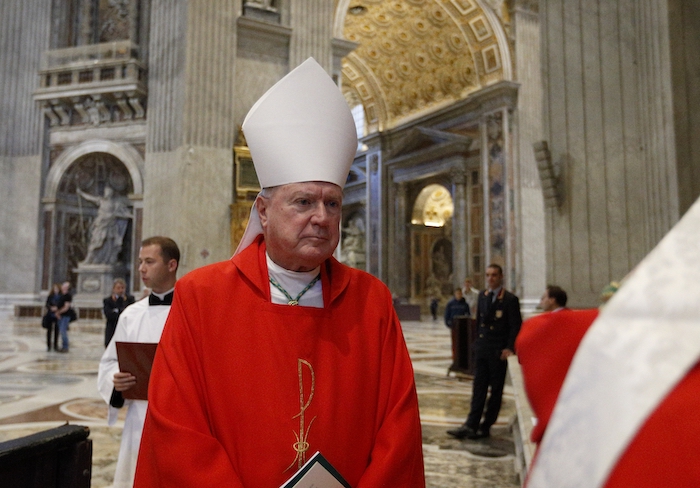— Guidance includes outing trans students to parents, banning pride flats and preferred pronouns that don’t match sex assigned at birth

The Catholic Diocese of Cleveland has issued a sweeping policy statement on sexuality and gender identity in parishes and schools which LGBTQ advocates have called “chilling” and “draconian.”
Among the items, it requires faculty and staff to out students to parents should they witness any signs of “gender dysphoria,” bans gender transitions and the display of pride flags, and will outlaw same-sex couples from attending school dances. It does not recognize sexual orientations or identities like lesbian, gay, bisexual or transgender and instead refers to people “experiencing gender dysphoria or gender confusion”.

“The standards really take to a new low some of the policies we’ve seen coming out of state houses around the country, as well as coming out in proposed bills out of the Ohio legislature.” said Dr. Ben Huelskamp, executive director of LOVEboldly, a nonprofit dedicated to developing spaces where LGBTQ+ people can thrive in Christianity.
Across the United States, more than 500 anti-LGBTQ+ bills have been introduced in state legislatures in 2023, according to the American Civil Liberties Union. In Ohio alone, 10 bills targeting the LGBTQ+ community have been introduced through bans on trans women in sports, gender-affirming care, drag performances and more.
“These acts, whether we’re talking about public schools or private schools, or in this case, again, the Diocese of Cleveland, really are aiming to erase LGBTQIA+ students and staff and faculty members, both from their schools and, frankly, just out of existence,” Huelskamp told Scene.
It comes as Pope Francis made headlines after criticizing the “very strong, organized, reactionary attitude,” of some American Catholics who have replaced faith with ideology at a meeting in Portugal on August 28.
According to the policy statement: “A person experiencing gender dysphoria or confusion will not be denied admission to an institution or be excluded from an institution’s life and activities…However, those persons who choose to openly express disagreement with Church teaching on matters of sex, sexuality, and /or gender in an inappropriate or scandalous way, or who act in ways contrary to the teachings of the Church, may be subject to restrictions on his or her participation in the life of the institution or, in appropriate cases, to disciplinary action.”
The formal policy, which affects all diocesan institutions, including offices, parishes, parish schools, and diocesan schools, was developed by a team of experts chosen by Bishop Edward Malesic and released on August 30.
As of September 1, the policy:
- Requires faculty and staff to notify the parents of minors “experiencing gender dysphoria or gender confusion”. In cases where notifying a parent could result in physical abuse of the minor, faculty and staff are to instead consult the Diocese Legal Office. The release does not address other forms of abuse but specifies that refusal to “to treat their child in any manner inconsistent with their God-given biological sex is not abuse and is not a compelling reason to not disclose”.
- Bans the designation of preferred pronouns that do not “accurately reflect a person’s God-given biological sex”. Nicknames other than abbreviated versions of one’s legal name can be used to address “a person experiencing gender dysphoria or gender confusion” only if they do not “obscure or contradict the person’s God-given biological sex, promote the idea that one’s gender is different than one’s God-given biological sex,” or cause scandal.
- Requires people to use bathrooms and facilities that “correspond to their God-given biological sex”. Individual institutional leadership has the discretionary power to accommodate the use of single-user bathrooms upon request.
- Restricts admittance to single-sex institutions and institutional programs–like extracurriculars, athletics or ministries–consistent with his or her God-given biological sex. Institutional leadership has discretionary power to allow “biological females competing on athletic teams designated for biological males when deemed appropriate”. Other exceptions have to get approval from the bishop.
- Bans attendance to institutional events with a “date of the same God-given biological sex or publicly express and/or display sexual attraction to or romantic interest in members of the same-sex at such event.” The institution has the discretion to allow attendees to attend alone, with a platonic friend or with a group of platonic friends.
- Requires people to “present and conduct themselves in a manner consistent with their God-given biological sex” and bans “acting in a manner the purpose of which is to hold themselves out as being a sex or gender that is inconsistent with the person’s God-given biological sex” or would cause confusion or scandal about the “person’s sex or gender relative to the person’s God-given biological sex.” Examples given include dressing “consistent with their God-given biological sex” and complying with sex-specific dress codes.
- Bans “publicly advocate or celebrate sexual orientation or identity” in ways that are contrary to the Catholic Church’s teaching and that could cause disruption, confusion, or scandal regarding the Catholic Church’s teachings.
- Bans symbols like, “‘LGBTQ pride’ rainbows or ‘LGBTQ pride’ flags or other symbols that can be construed as being opposed to Church teaching” on institution property or at events the institution is participating in or sponsoring.
- Bans gender affirming medical care and social transitioning, which it defines as “the adoption of pronouns, clothing, haircuts, and other social expressions of gender or sex for the purpose of holding out oneself as being a sex or gender different than one’s God-given biological sex.” It allows for medical treatment of “true genetic or physical anomalies, disorders, or medical conditions” but does not detail what would qualify.
- Requires institutional records and documents to use “person’s God-given biological sex and legal name” and bans the alteration of existing records following a legal name change.
“First, it’s going to have a chilling effect on what students, staff, faculty and others, how those groups can express themselves, how they can dress, how they can just simply act in ways that are authentic to them based on their own gender identity, or their own gender expression” Huelskamp said. “Further, it really takes another chilling effect for people who want to be allies to those folks.”
The full policy statement and a corresponding cover letter by Bishop Malesic is available on the diocesan website.
The Diocese did not respond to questions from Scene but issued the following statement:
“In response to societal trends and at the request of church and school leadership, the Catholic Diocese of Cleveland has taken existing guidance and practice in matters of sex, sexuality, and gender identity and developed them into a formal policy, rooted in scripture and Church teaching, to help ensure that these matters are addressed in a consistent, pastorally sound, and authentically Catholic manner across our diocesan and parish institutions and schools.
“Each and every person is welcome and invited to be a part of the Church. Each one of us brings our own struggles and questions, and the Church, like Christ, meets each one of us where we are. It is our hope that this policy, in tandem with the pastoral and theological resources found on the diocese’s website, helps each person to live more fully in the truth of their identity as a son or daughter of God who is made, body and soul, in His image.”
“There’s still hope available. There are still people in their parishes in their schools who will support them…We know that there are good and well meaning Catholics out there who either are themselves queer, or who totally support the queer community,” said Huelskamp. “That support does not go away because one bishop or one diocese says that they’re going to embrace these, frankly, draconian policies.”
Complete Article ↪HERE↩!



:max_bytes(150000):strip_icc():focal(723x147:725x149):format(webp)/simon-kent-fung-083123-1e444f4a791642a79132c2840cbec81c.jpg)
:max_bytes(150000):strip_icc():focal(424x0:426x2):format(webp)/Alana-Chen-3-082923-c06d04caca04401e96136bafbe9b4239.jpg)
:max_bytes(150000):strip_icc():focal(532x0:534x2):format(webp)/Alana-Chen-1-082923-b703f217c1f345c2b98eb1e82d366dd8.jpg)
:max_bytes(150000):strip_icc():focal(749x0:751x2):format(webp)/Joyce-Calvo-082923-12031cd566fa439e97ffa88efc5e3cf7.jpg)

